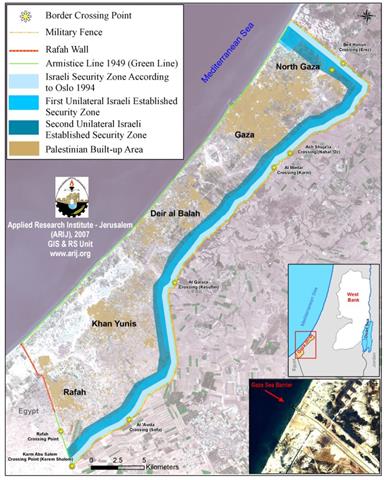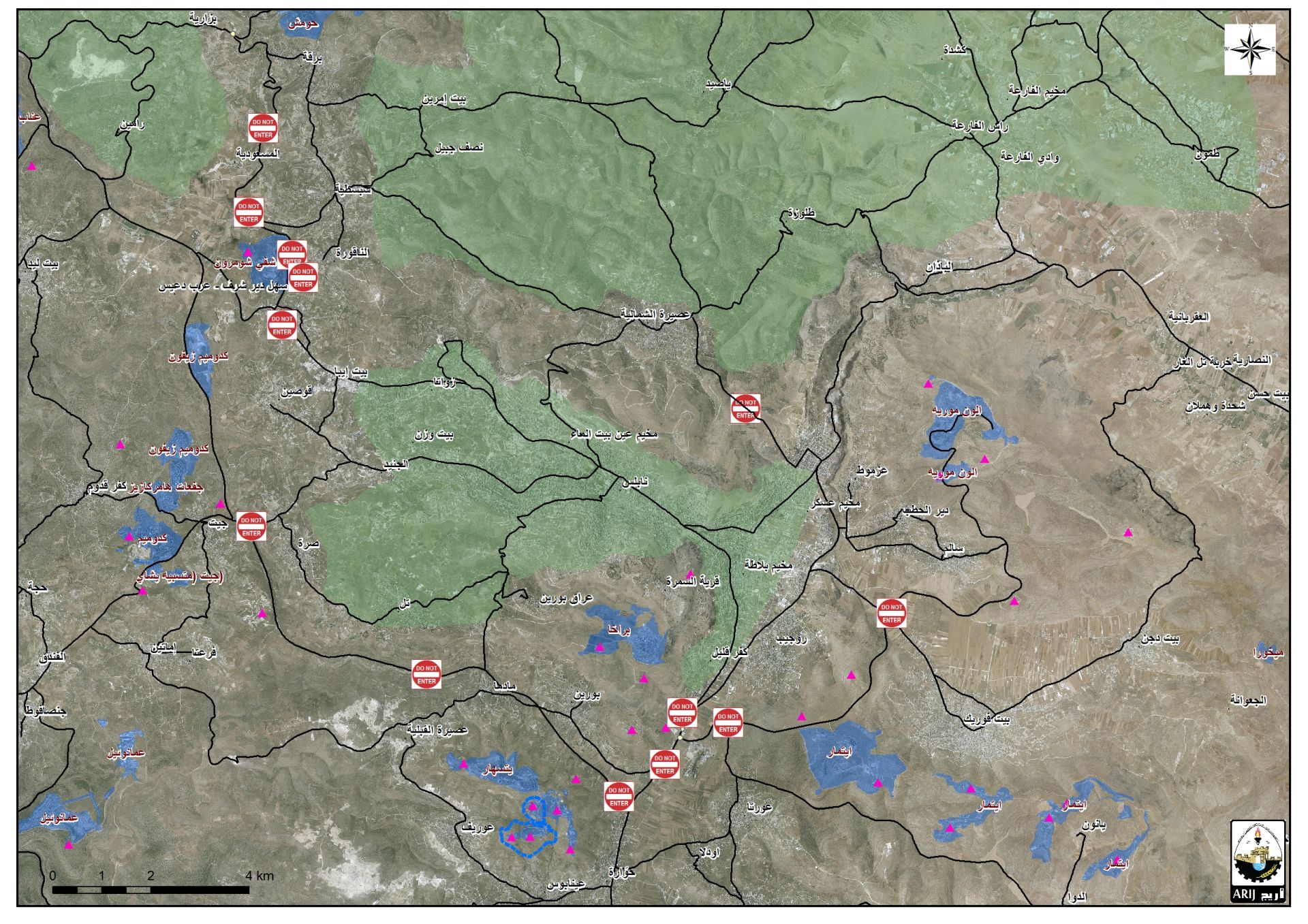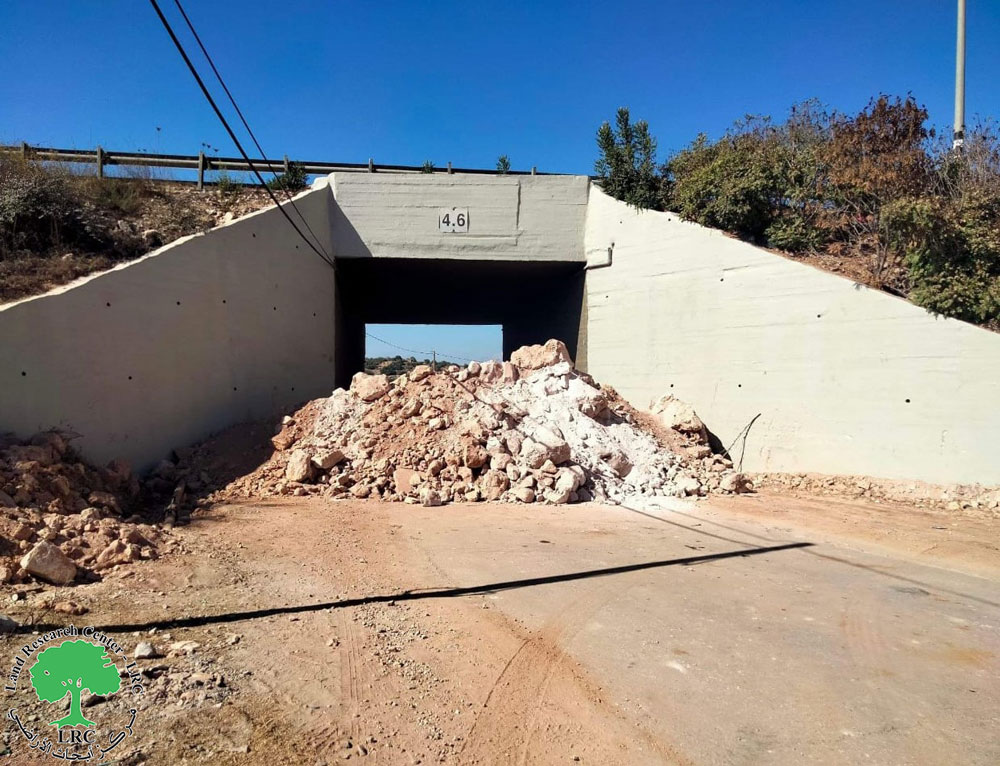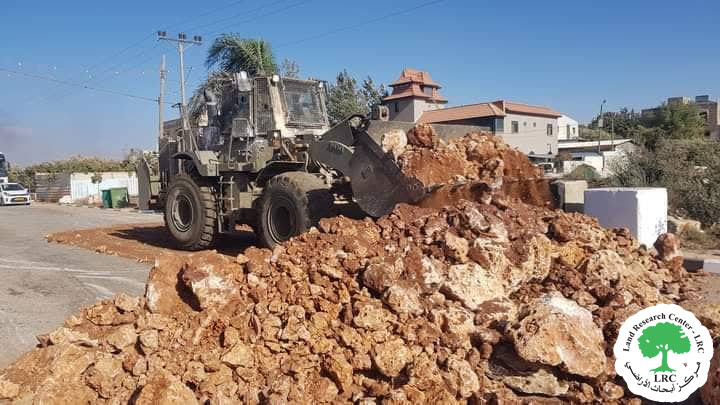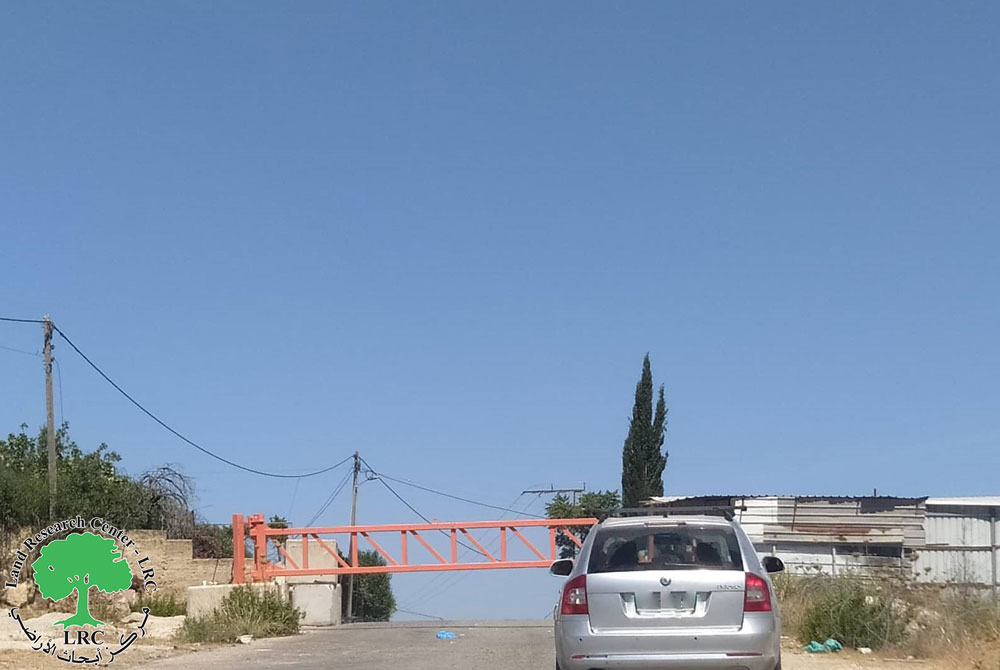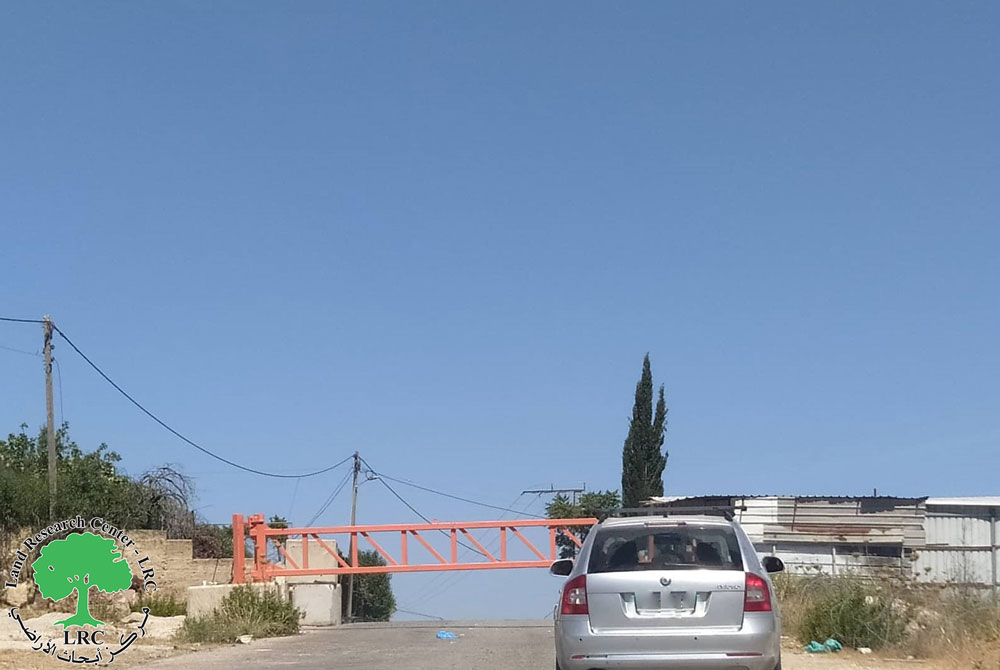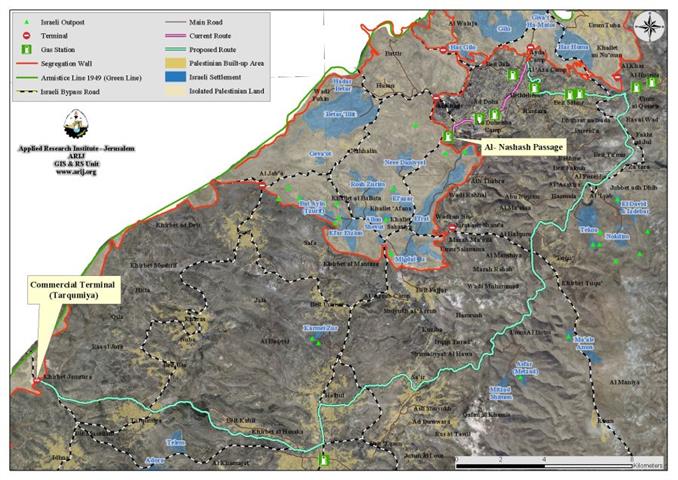The 19th September 2007 Gaza Strip was declared by the Israeli Cabinet a 'Hostile Entity'; the announcement led directly to the closure of the Strip for 'security reasons'. Gaza Strip is connected to the outside world through seven crossing points:
1. Beit Hanoun (Erez) Crossing
2. Al-Shogaeih (Nahal Oz) Crossing
3. Al-Mintar (Karni) Crossing
4. Al-Qarara (Kesufiem) Crossing
5. Al-Awada (Sofa) Crossing
6. Karm Abu Salem (Kerem Shalom) Commercial Crossing
7. Rafah International Boarder Crossing
Except for Rafah boarding cross, which connect Gaza to the Arab Republic of Egypt; Israeli Forces control all the terminals. The survival of nearly 1.5 million Palestinians living in the Strip depends on the trade with Israel, which commanded to reduce drastically the amount of goods imported to the area and to prohibit the export of products, thus downsizing the economy of the Strip and debasing the life of its population.
Beit Hanoun Terminal: it is located north of the Gaza Strip and is designated as a crossing point for Palestinians going out or in of the Gaza Strip from the West Bank or Israel. It is completely controlled by the Israeli Army. Palestinians who need special medical treatments; maybe allowed access pending security clearance from the Israeli Army but even that has stopped following the June 2007 event when Hamas muscled the Authority and became in control. Since the beginning of Israeli blockade, about 90 persons died, as they did not have the consent to access adequate medical treatment.
The other crossing points are trade terminals. Al-Mintar, in the east of Gaza City, is the main commercial crossing point, but after the blockade of the Strip, it is used just for the limited importations (exportation is forbidden) of flour and animal feed. As for the remaining checkpoints, they are open only for importation purposes (food supplies, and fuel) just enough for the population to survive.
As a result, the siege of Gaza has deprived Palestinians of freedom of movement, making it impossible the flow of food, medical supplies, and many other primary goods, such as fuel and different raw materials for various economic sectors. The economy of the Strip has been completely destroyed by the siege. Unemployment stands today at 80%, thus placing almost 85% of the population in the Gaza Strip under the poverty line. The lack of food and of stockpile of products led to the increase of the price of primary goods, aggravating the situation of the people there, where the majority cannot sustain the unprecedented raise of living or just going-by costs.
The siege grants the Israeli government the control of fuel supply, water supply, electricity supply, basically all the essentials of life there; Israel controls the activities in the sea and in the sky, violating many fundamental human rights of the Palestinian civil population, such as the right to live in appropriate conditions, to work, the rights of education and health.
In addition, the IOF carryout frequent incursions to the Strip from allegedly for security purposes, seeking out Palestinian militant from the resistant groups. The results of such incursions are always catastrophic: each time the IOF destroy hundreds of dunums of cultivated lands causing much causality, and killing civilians, as 'Collateral Damages,” of their so-called 'defensive operations.”
-Violations of the International Law – Collective Punishment
Such a blockade is an outrageous violation of the international law and it is an evident disregard of the Universal Declaration of Human Rights.
As the Israeli government backed up by its racist legal entity sanctioned the decision of the Israeli Army to decrease the amount of fuel delivered to Gaza to just surviving level and some time to a total withhold, depriving residents there from electricity and transportation fuel. Even hospitals were unable at some point to activate the power generation to keep the hospital’s equipment running. The Israeli actions stand in contradiction of international humanitarian law, which applies during war times and military occupations: a government that has effective control over a territory, such as the one Israel has over Palestinian Territories, is prohibited from attacking or denying objects that are essential to the survival of the civilian population.
In addition, Israel’s actions in Gaza, is infringing a strict limit posed by the international law: the principal of proportionality, which states that a country, although it has the right to defend itself from an attack, can only use the amount of force against military objectives necessary to achieve its aim. By contrast, Israel is making suffer the whole population of Gaza. That goes clearly beyond the right of defense granted by the international law.
Collective Punishment is a comprehensive policy adopted by Israel in the Gaza Strip, against the population there. However, what Israel is leading in Gaza Strip is the most brutal the Palestinians had experienced since 1967. Houses’ demolition, trees uprooting, land confiscation, imprisonment of family members as a mean of pressure, are part of Palestinians' everyday life, but the siege, the blockade, the cut of water, fuel, primary goods and electricity, the incursions and the killing of civilians, are much crueler and are in no way justified as defensive measures.
Collective Punishment is certainly an illegal action, which cannot be justified; it is illegal under any and every circumstances. There are several different branches of the international law that affirm its illegality, such as the international human rights law, the international humanitarian law, including the Fourth Geneva Convention in 1949 relative to the Protection of the Civilian Persons in War Time.
-Article 4. Persons protected by the Convention are those who, at a given moment and in any manner whatsoever, find themselves, in case of a conflict or occupation, in the hands of a Party to the conflict or Occupying Power of which they are not nationals.
-Article 33. No protected person may be punished for an offence he or she has not personally committed. Collective penalties and likewise all measures of intimidation or of terrorism are prohibited. Pillage is prohibited. Reprisals against protected persons and their property are prohibited.
Also article 50 of the Hague Regulations states an analogous interdiction.
-Article 50. No general penalty, pecuniary or otherwise, shall be inflicted upon the population on account of the acts of individuals for which they cannot be regarded as jointly and severally responsible.
-The failure of the International Community
The 28th of November 2007 the Israeli Supreme Court rejected the petition submitted by several Palestinian and Israeli Human Rights Organizations, asking the end of the siege and of the abuses of basic human rights by the Israeli state. That decision of the Israeli Court was as a legal support, which gave Israeli Army the authorization to continue its activity in the Strip. To make the situation even more dramatic, and to destroy the last hope of the population of the Strip, on January 17, 2007 the Israeli Minister of Defense, Ehud Barak, reaffirm the imposition of closure of all the terminals that connect the Strip to the outside World.
Employing these measures, Israel seeks to annihilate the Palestinian resistance, not only the armed opposition, but the determination, the willing of resistance of the population of the Strip.
On the other hand, such the Collective Punishment policy has undoubtedly been effective provoking tragic Humanitarian Crisis in the Strip under Siege.
As Israeli's activities in the Strip are clearly illegal, it is very difficult to realize how it can carry on with its policy. So the evident question here is how can such violations of international law and abuses of human rights be tolerated by the international community?
Israeli's measures against the population of the Strip have been defined 'collective punishments' by the European Union and by the majority of the international community, which condemned the illegal conduct.
John Dugard, the UN special reporter on the human rights condition in the Palestinian Territories, accused Israel of committing war crimes and inflicting collective punishments in Gaza Strip. That is a huge accusation, especially because he intensified his declaration affirming that Israel is not distinguishing between militants and civilians
Today, and even with the world condemnations of its actions, Israel has not taken any measure to end its collective punishment policy; on the contrary, it is fortifying them with the approval and blessing of its Supreme Court. Since February 7, 2008, Israel again initiated further steps to reduce again the supplies of fuel and electricity to Gaza, thus increasing the punitive measures taken against Gaza's civilian population. According to a plan submitted to the court, Israel’s Electric Company is set to reduce of Gaza’s share an additional 1.5 MW by the end of February.
It is happening while the World stands still!
The international community has not been able to go beyond the condemnations of Israel’s illegal actions in the occupied territory, and if anything Israel perceives the international community mellow reaction as a sign of approval to what is happening in the Gaza Strip; more like ”proceed with caution” which explains why no penalty has been issued against the state of Israel so far, at least to compel it to stop the criminal conduct; and Collective Punishments policy. Above all, the United Nations Security Council has not issued or even suggested a resolution to condemn the Israeli actions in the Gaza Strip.
Accordingly, the Israeli government knows that it has all the latitude to exploit the international incapability, and the failure of the United Nations Security Council in issuing a clear resolution regarding its illegal practices against Palestinian civilians in Gaza Strip. The passive response on the international level is a clear signal of the ineffectiveness of the international law, and an obvious evidence of the incapacity of the international community, to take decisions that go beyond single States' interests.
As a result, the population of Gaza will continue to experience all the Israeli abuses of international law and of fundamental human rights under the eyes of the entire world; no how much more will the Gaza Strip continues to live such terrible humanitarian crisis.
:::::::::::::::_
[1]Convention (IV), relative to the Protection of Civilian Persons in Time of War. Geneva, 12 August 1949
[2]Hague Convention IV Respecting the laws and Customs of War on Land, 18 Oct. 1907, entered into force 26 Jan. 1910
[3]Press statement by the UN Special Reporter on the situation of human rights in the Palestinian territories occupied since 1967, John Dugard, 18th January 2008
Prepared by
The Applied Reserach Institute – Jerusalem


